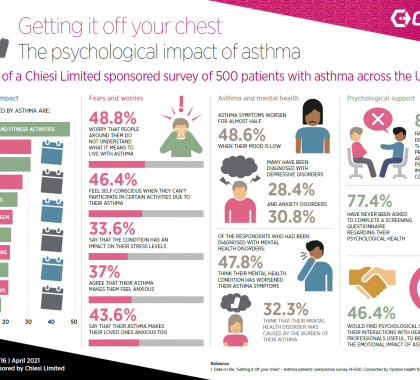
When most people think of asthma, they think of its impact on breathing and physical activity. So, it won’t be surprising to know that in a survey of 500 UK adult asthma sufferers, almost half of them (47.8%) said their asthma affected their participation in sports and fitness activities.
This is one of the findings of a Chiesi Limited sponsored survey of 500 adult patients with asthma across the UK in 2020. Take a look at the highlights below.
The responses to the survey showed that the impacts of asthma are far wider reaching than simply the effects it has on the respiratory system. Over 27% of people felt that their asthma affected their mood, while 21% said it had an impact on their social lives.
For many, asthma caused a range of fears and concerns, including the worry of people not understanding their condition and feeling self-conscious when their asthma prevents them from taking part in certain activities.
The survey suggests that 46.4% felt self conscious about participating in certain activities due to their asthma. This finding reinforces the importance of healthcare professionals (HCPs) in speaking to patients about asthma in a non-judgemental way. This could go a long way to helping those patients who feel self-conscious or embarrassed by the condition overcome these feelings and, as a result, potentially feel more capable of managing their asthma successfully.
As well as highlighting the need for HCPs to help patients manage their asthma symptoms, the survey emphasised the value of taking the time to understand what factors individual patients find exacerbate their symptoms. For some patients, these will be the standard triggers like physical exercise, allergens, and pollution. For others, there may be other factors at play. Amongst those who had an existing mental health condition, 47.8% said they felt that this had caused worsening of their asthma symptoms.
As with any health problem, asthma can bring its own worries, both for the sufferer and his or her family. Of those surveyed, 37% said their asthma made them feel anxious, while almost 44% said it caused their family anxiety.
However, 81% said they had never discussed the psychological impact of their condition with an HCP.
Taking the time to identify and tackle this anxiety could help to relieve pressure on both patients and the NHS. Much of this will come from talking patients through the best way to manage their asthma and helping them understand their condition in more depth.
Once they understand their asthma, what triggers it and how they can deal with it, patients should hopefully feel less anxious and more in control. This feeling of reassurance should then be passed to their concerned family members through patients sharing their knowledge and being more visibly in control of their condition.
You can see more of the findings from the Asthma survey in this infographic.

If you want to build your asthma knowledge further, make sure you check out the Respiratory Refresher elearning modules.
Any advice given and opinions expressed in this article are those of the author and do not reflect the view of Chiesi Limited (Chiesi). All content in this article is for informational and educational purposes only. No advice in this article is intended to be a substitute for your own professional judgment in the clinical management of your patients.



 Jane Scullion
Jane Scullion 

